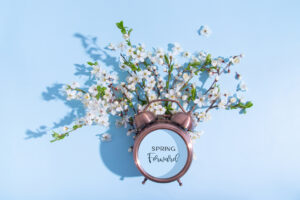 I’m sitting at my kitchen table on the first day of the new daylight savings time. I must admit, I like the “fall backward” time change, which is much more appealing on day 1, but I am looking forward to tomorrow’s after work increased daylight to exercise outdoors and work in the garden. But today, I don’t like that feeling of an hour of lost time.
I’m sitting at my kitchen table on the first day of the new daylight savings time. I must admit, I like the “fall backward” time change, which is much more appealing on day 1, but I am looking forward to tomorrow’s after work increased daylight to exercise outdoors and work in the garden. But today, I don’t like that feeling of an hour of lost time.
It’s not just the impact on one’s daily activities to consider. This time change can have some other impacts that can be harmful. Let’s start with sleep, and I’m talking more than just cranky or tired the next day. Sleep troubles can linger for weeks or even longer. The darker mornings and more evening light can disrupt melatonin and circadian rhythm. Not unlike traveling across many time zones, and we don’t all react the same. Now if you live in Hawaii or most parts of Arizona, Puerto Rico, American Samoa, Guam and the U.S. Virgin Islands, or some other parts of the world, you all are spared this switch because you have a likely more sensible approach of year-long standard time.
The brain is set on a circadian rhythm of roughly a 24 hour cycle which determines our onset of sleepiness and alertness. While it changes with age, we all have this. The morning light exposure resets the rhythm. I know this as the cortisol awakening response. Melatonin has dropped off and cortisol rises. In the evening, levels of melatonin begin to surge which triggers drowsiness. That extra hour of light from our daylight saving time, delays that surge and this circadian rhythm gets out of sync. Sleep is a precious commodity, and sleep deprivation is associated with heart disease, cognitive decline, obesity, type 2 diabetes, excess alcohol use, depression and anxiety. This circadian rhythm influences heart rate, blood pressure, stress hormones and metabolism.
A few things I learned recently is that fatal car crashes temporarily rise the first few days after this springtime clock change. By the time you read this, the sharpest increase has passed, which is the first morning of the time change, due to sleep deprivation. Another concern is that there are studies that suggest an increase in heart attacks on the Monday after daylight savings time begins, and in strokes for the two days following. Strokes are in general more common on Mondays, and in the morning, when we are more prone to clotting.
So when it comes to the first few days of day light savings time— be easy on your heart and your sleep.
I guess my best advice is only useful for next year when we might still be in this situation if the government does not change the twice a year clock changing. We should go to bed a littler earlier two nights before the daylight savings time night, and try to get more light the following morning. It also might be good to help your body adapt by changing your dinner time and exercise time a couple days prior as well. Then there is always the afternoon nap and caffeine.

